- Moving India Forward
- Mahindra Truck & Bus
- Ashok Leyland
- Apollo Tyres
- Automotive Research Association of India
- ARAI
- Asian Trucker
- Tyre Trends
- Tata Motors
- MAN Trucks
- Continental India
- Tyresoles India
- Volvo Trucks
- Dr Seshu Bhagavathula
- Rashmi Urdhwareshe
- Dr Venkat Srinivas
- Rahul S. Mahajan
- Sudeepth Puthumana
- Prashant Kakade
- Ministry of Road Transport & Highways
- MoRTH
- SKP Amarnath
- Apollo Tyres
- Vijay Shrinivas
- TREA
- Tyre Retreading Education Association
- Indag
- Mahesh Babu
- Switch Mobility
- Anil Baliga
- EKA Mobility
- Boddapati Dinakar
- VECV
- Shailesh Zinge
- Cummins India
- A Ramasubramanian
- Blue Energy Motors
- Bal Malkit Singh
- All India Motor Transport Congress
- AIMTC
- Prasanna Patwardhan
- Bus & Car Operators Confederation Of India
- BOCI
- Sanjay Sasane
- Institute of Driving Training and Research
Safety And Sustainability Take Centre Stage At Commercial Vehicles Conference 2024
- By TT News
- November 26, 2024
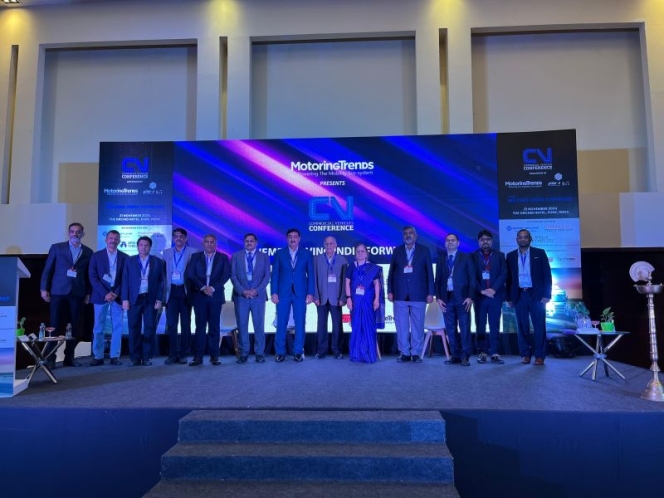
India’s commercial vehicle (CV) industry is rapidly aligning with global standards, thanks to policy reforms, evolving customer expectations and a robust domestic ecosystem. Automakers and suppliers are making significant strides in cost competitiveness, safety innovations and integrating alternative energy solutions. As the sector continues to evolve, the need for collaboration and strategic discussions has never been more critical.
Recognising this imperative, Motoring Trends, a leading automotive magazine, hosted its inaugural Commercial Vehicles Conference on 21st November 2024, in Pune, India. Themed ‘Moving India Forward’, the event served as a platform for industry leaders, including OEMs, suppliers, technocrats, fleet operators and industry partners, to address challenges and identify opportunities shaping the future of the Indian CV landscape.
By bringing together stakeholders from across the value chain, the conference underscored the importance of collective action in driving innovation, enhancing safety standards, and adopting sustainable practices. As the CV industry transforms to meet global benchmarks, such forums are vital to ensuring India’s leadership in the sector while addressing its unique market dynamics and needs.
Mahindra Truck & Bus, Ashok Leyland and Apollo Tyres supported the event as sponsors, while Automotive Research Association of India (ARAI) was the Associate partner, while Asian Trucker and Tyre Trends were the Media partners. The delegates at the event attended from a range of companies such as Tata Motors, MAN Trucks, Continental India, Tyresoles India, and Volvo Trucks among others.
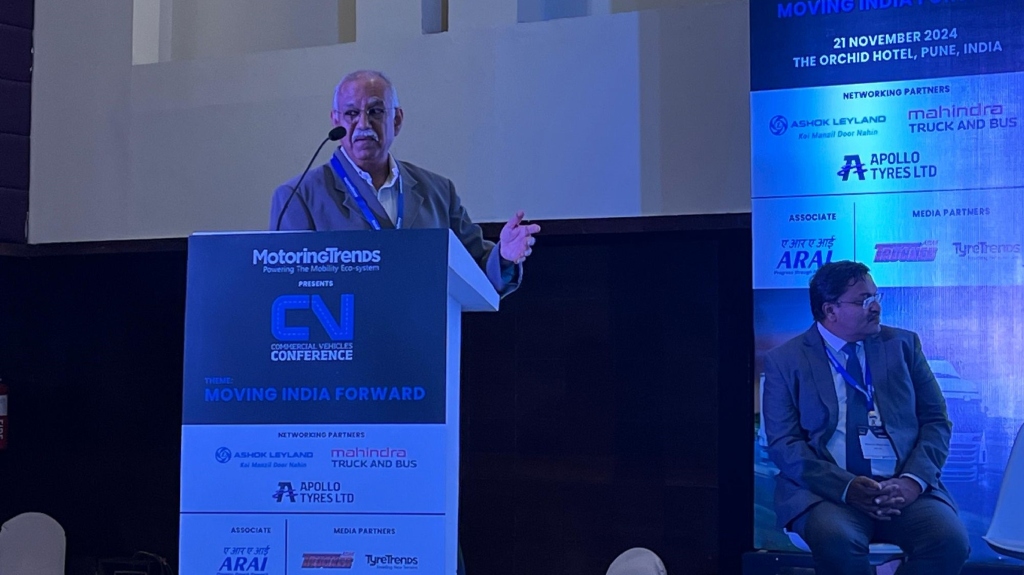
The event kicked off with Dr Seshu Bhagavathula, Director, CityQ and an automotive industry veteran delivering the Keynote address, where he highlighted how urban cities around the world are working to decongest and decarbonise their streets. “This (decongestion and decarbonisation) requires a serious relook and focus on improving urban mobility as well as the role of alternative energy to support the transition,” Dr Bhagavathula.
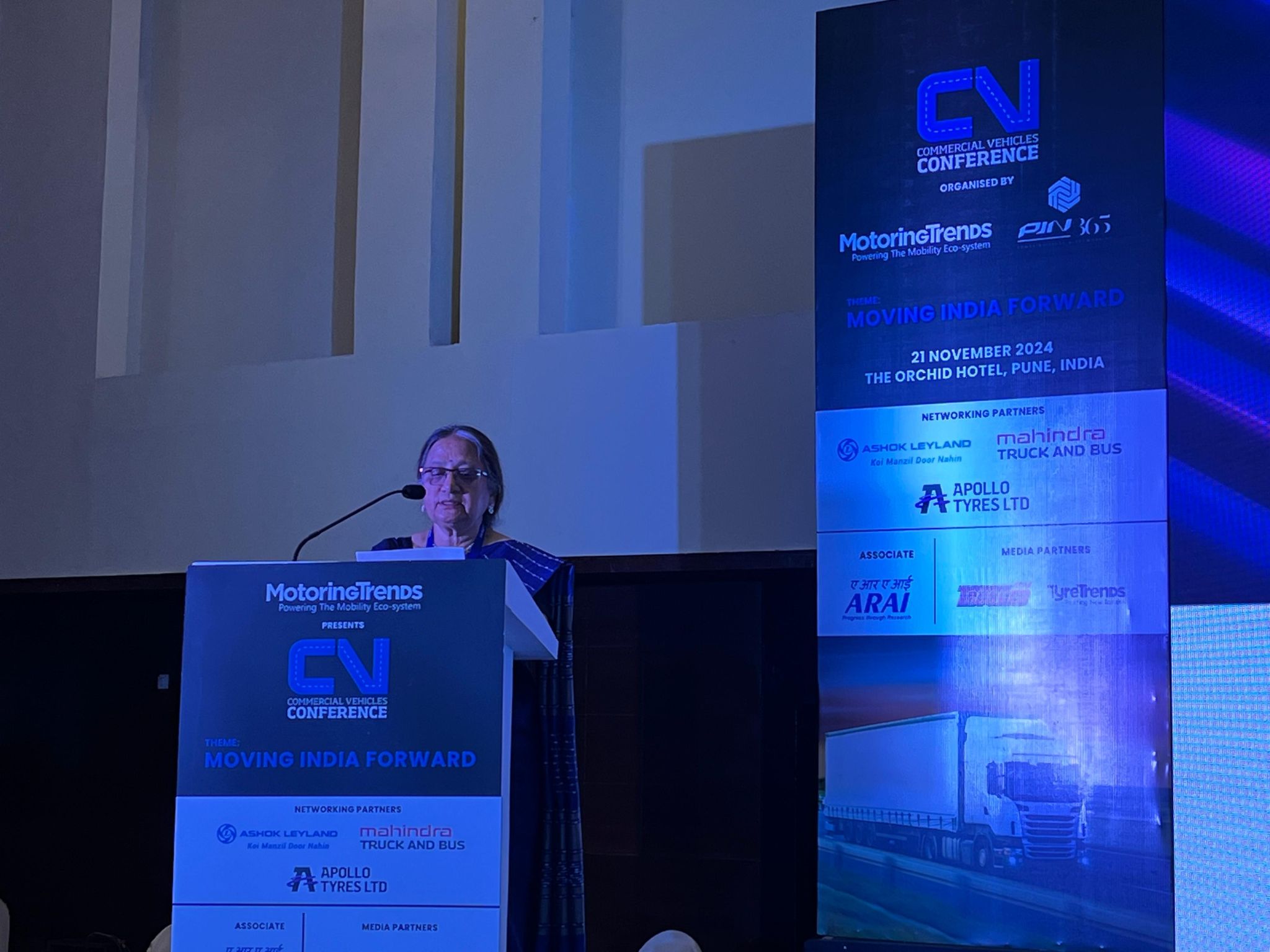
Rashmi Urdhwareshe, Former Director, Automotive Research Association of India (ARAI) shared her perspective on how the automotive industry has been focussing on not just introducing the latest technologies, but also co-developing solutions to meet the India-specific needs. She emphasised the close cooperation between testing agencies, suppliers and OEMs that is accelerating the transition to the latest technologies.
Making commercial vehicles safer
The commercial vehicle population on Indian roads accounts for a small parc of the total vehicles, but ranks 3rd when it comes to the vehicles involved in road accidents. In 2022, more than 460,000 accidents took place in India, which resulted in over 168,491 people losing their lives and over 443,366 people being injured.
The first panel discussion of the day focussed on one of the most important aspects pertaining to the CV industry – Safety. The panellists for the session included – Dr Venkat Srinivas, Head Of Business, Mahindra Truck & Bus; Rahul S. Mahajan, Deputy Director, The Automotive Research Association of India (ARAI); Sudeepth Puthumana, Head of Segment – ADAS, Autonomous Mobility, Continental Automotive India and Prashant Kakade, Ministry of Road Transport & Highways (MoRTH).
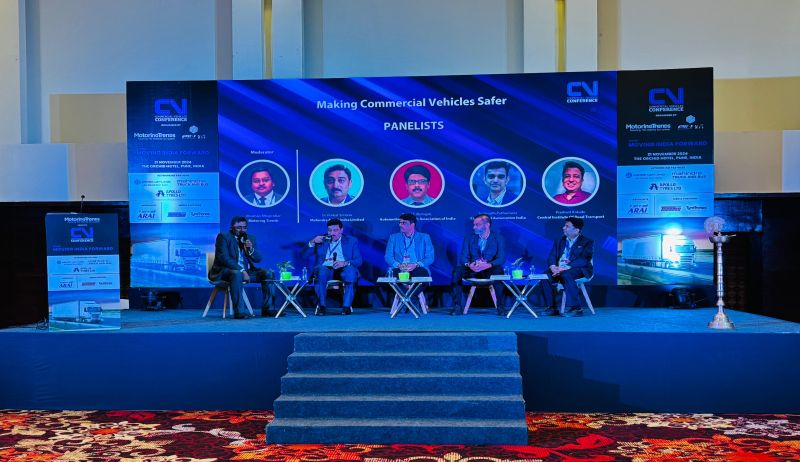
The session, moderated by Bhushan Mhapralkar, Editor, Motoring Trends, touched upon various factors ranging from ADAS technology, and road designing to driver training and sensitisation.
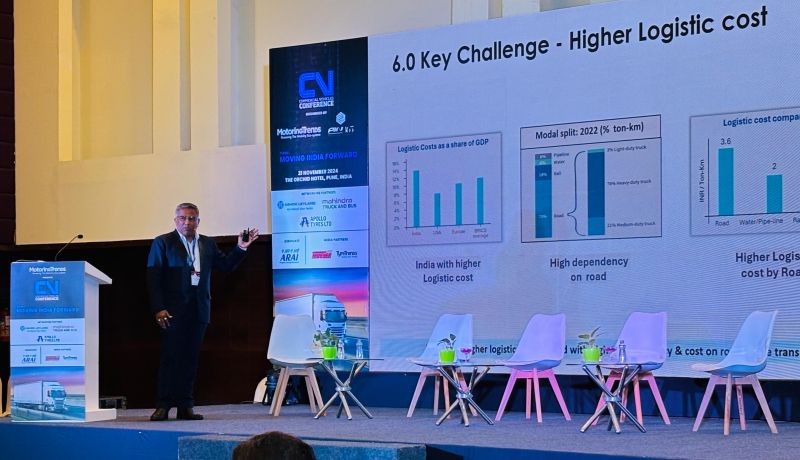
SKP Amarnath, Group Head - R&D, Apollo Tyres gave a presentation on ‘Commercial Vehicle (Truck) Evolution In India And Impact On Tyres’. He dwelled into the key developments that have taken place in the CV industry and how tyres can play a key role in influencing vehicle safety and efficiency.
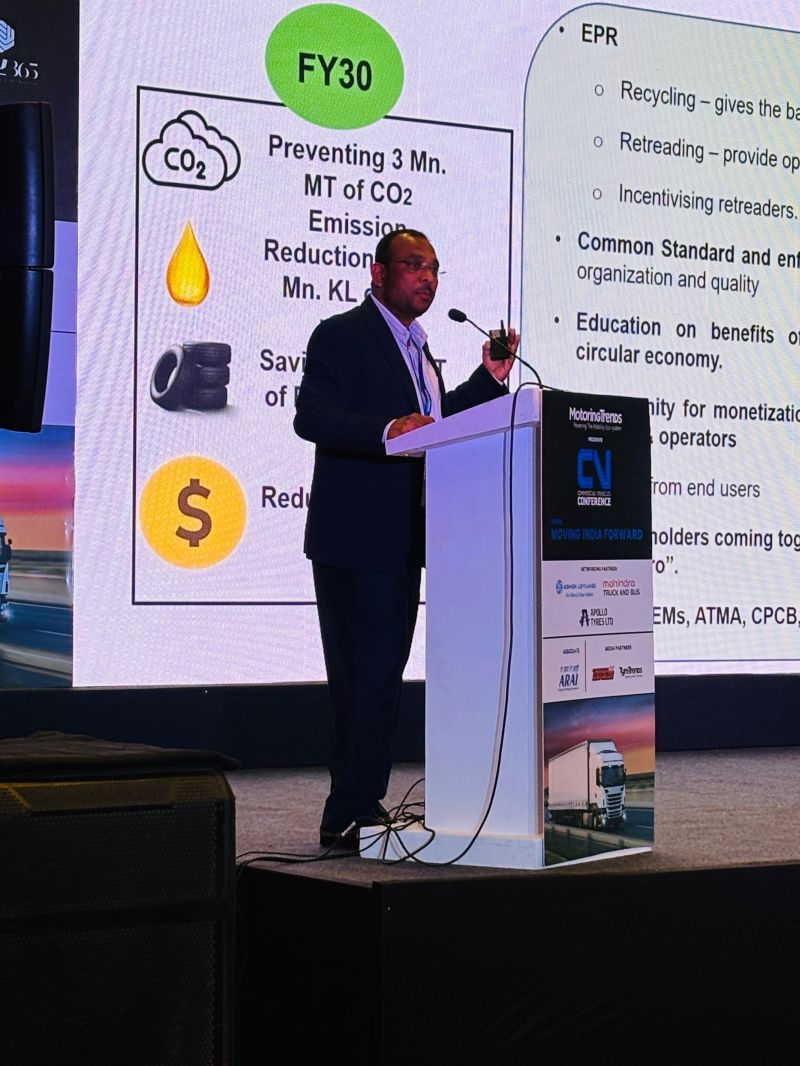
Vijay Shrinivas, Member, TREA - Tyre Retreading Education Association and CEO, Indag, gave a presentation on ‘Driving Sustainability and Circularity in Commercial Vehicle Industry’. He presented his thoughts on how treading not only helps save costs on tyre replacement but also enables higher circularity and thus helps reduce carbon emissions too.
Alternative energy & future of commercial vehicles
The role of alternative energy has been a key topic of discussion globally across vehicle segments. While there has been a focus on electrification in certain vehicle classes, the commercial vehicle segment will need to adopt a mixed approach depending on the application and use case.

The second panel discussion was on the topic of Alternative Energy and the Future of Commercial Vehicle. The panellists – Dr Bhagavathula ; Mahesh Babu, CEO, Switch Mobility; Anil Baliga, President, EKA Mobility; Boddapati Dinakar, Executive Vice-President, Sales & Marketing, Volvo Trucks, VECV; Shailesh Zinge, Director - Marketing, Growth Initiatives and Program Management, Engine Business, Cummins India and A Ramasubramanian, CTO, Blue Energy Motors presented their perspective on the alternative fuel segment.
The session was moderated by Nilesh Wadhwa, Assistant Editor, Motoring Trends.
The discussion focussed on how industry stakeholders were exploring various energy mix ranging from electric, LNG to future fuels such as hydrogen and fuel cells. The panellists agreed that globally too at present there was no single fuel that could completely overhaul the commercial vehicles segment. There was a need to not only focus on the vehicles but the necessary charging/refuelling ecosystem.
Transport ecosystem
The health of the CV industry is one of the key barometers to understand a country’s economic prosperity. While one can discuss the trends, policies and technologies, it is imperative that the views of the key stakeholder – fleet operators – are taken into account.
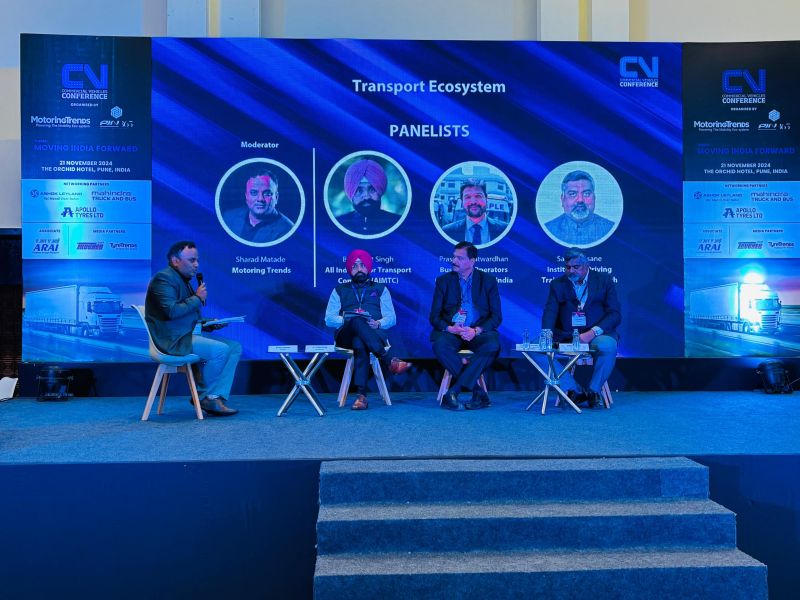
The third panel discussion of the day was on the topic of ‘Transport Ecosystem’. The panellists for the session were - Bal Malkit Singh, Chairman - the Core Committee, Former President, All India Motor Transport Congress (AIMTC) Prasanna Patwardhan, President, Bus & Car Operators Confederation Of India (BOCI) and Sanjay Sasane, Principal, Institute of Driving Training and Research (IDTR).
The session, moderated by Sharad Matade, Executive Editor, Motoring Trends, had an indepth discussion on how fleet operators continued to face headwinds ranging from increases in operational expenses, driver shortages and road infrastructure among others. At the same time, the revenues had not kept up at the same pace. The panellists also presented their perspectives on the adoption of newer technologies and alternative fuels.
Atul Patil, Vice-President – Marketing, Pin 365 delivered the Vote of Thanks.
Giti Tire Unveils Next-Generation GitiSportS2+ Following AutoBild Test Success
- By TT News
- March 05, 2026
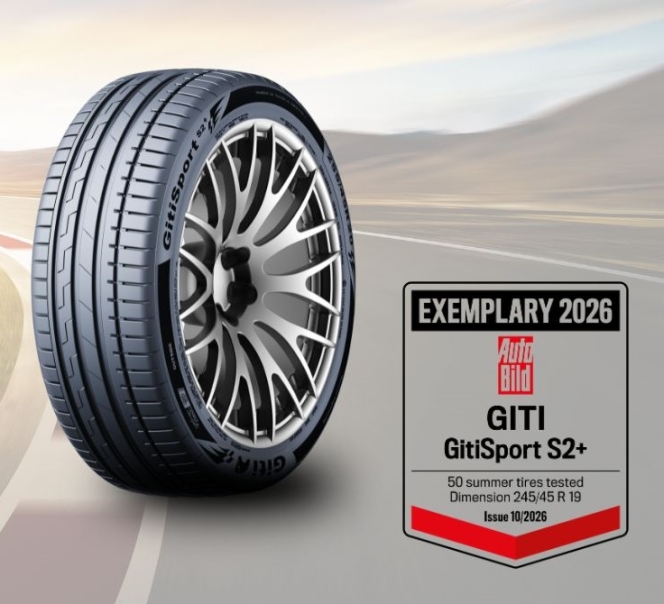
Giti Tire has launched its new ultra-high-performance GitiSportS2+ tyre, following an outstanding result in the AutoBild 2026 Summer Tyre Test, where it received one of the most prestigious independent endorsements in Europe. Rated as exemplary by the leading German publication, the tyre secured fourth place overall out of an initial field of 50 competitors. The evaluation praised its exceptional value for money, impressive driving dynamics and substantial safety margins.
Tested on a BMW 5 Series using the 245/45R19 size, the tyre initially shared fourth position based on wet and dry braking performance, recording a total stopping distance of 42.5 metres. It maintained this high standard across 12 additional assessments, ultimately ranking among the top five alongside several premium manufacturers. The new model is scheduled to be available from spring 2026, launching in 19 sizes covering rim diameters from 17 to 20 inches, widths between 225 and 255 and aspect ratios from 35 to 55.
Designed for sporty cars and powerful SUVs, the GitiSportS2+ features a newly engineered compound that reduces wet braking distances by eight percent and dry braking by two percent compared to its predecessor. It also achieves the highest possible EU Wet Grip label rating of ‘A’. In line with the manufacturer’s broader strategy, the tyre bears the AdvanZtech EV Ready sidewall marking, indicating its compatibility with internal combustion engines, mild hybrids, plug-in hybrids and battery electric vehicles.
During the initial rollout, many existing sizes of the original GitiSportS2 will remain on the market, ensuring continued coverage across the sport vehicle segment. Development took place at Giti’s European R&D Centre in Hannover, with testing and fine-tuning conducted at tracks in UK and Spain. The project leveraged the company’s AdvanZtech technology, a globally integrated research and development system.
Fabio Pecci-Boriani, Deputy General Manager – Product Planning PCR and LTR, Giti Tire R&D Centre (Europe), said, “The new GitiSportS2+ is testimony of the achievements that our engineers, testers and manufacturing facilities have been able to deliver in the area of performance while retaining the sustainability, endurance and mileage criteria that are important to the daily driver. To launch a tyre off the back of an ‘exemplary’ rating in AutoBild is nothing short of sensational; we are thrilled that one of the leading automobile titles in Europe has been able to validate and confirm our latest development and we are excited to share this news with our trusted customers.
“The target criteria for the GitiSportS2+ was to deliver further improvements in dynamic driving, enhanced control on wet roads with precise and exciting control on dry roads, all while maintaining the mileage and energy efficiency of the previous generation. Sportiveness is at the heart of the tyre with a particularly stiff design that contributes to stability at high speeds as well as in cornering. The increased grip performance goes is more precise, firm, predictable and constant.”
Halfords Appoints Jessica Jones As Director Of Fleet Solutions
- By TT News
- March 05, 2026

Halfords has signalled a strategic push into the B2B mobility market by naming a new leader for its fleet division. Jessica Jones is set to become Director of Fleet Solutions from the start of April 2026, tasked with accelerating growth in this area. She arrives with considerable expertise in the fleet, leasing and B2B mobility sectors, having spent her career guiding national account teams and forging strong customer relationships that have driven commercial success.
Her background encompasses strategic fleet management, business expansion and the creation of adaptable service models for corporate clients. Prior to this appointment, Jones served as Sales Director at Sixt UK and held the position of Director of National Fleet Sales at ATS Euromaster. Her recruitment underscores Halfords' commitment to developing its fleet services as a core area for expansion.
The company aims to support businesses by utilising its extensive network of garages to provide integrated maintenance and mobility services. These offerings are designed to maximise vehicle availability and assist companies in controlling operational expenditure.
Adam Pay, Managing Director of Garages at Halfords, said, “Fleet is a significant growth opportunity for Halfords, and Jess brings deep sector expertise alongside a strong track record of building high-performing teams and customer partnerships. As fleets face increasing cost pressures and operational complexity, our national scale and service capability position us strongly to support customers. Jess’s leadership will help us accelerate momentum and unlock further opportunities in this important market.”
Jones said, “I’m delighted to be joining Halfords at such an exciting point in its growth. The business combines a trusted consumer brand with a powerful national servicing network, creating real potential in fleet. I’m looking forward to working with colleagues and customers to build on the strong foundations already in place and further develop a differentiated, customer-focused fleet offering.”
Triangle Tyre Appoints Federico Parmesan As European OTR Technical Manager
- By TT News
- March 04, 2026
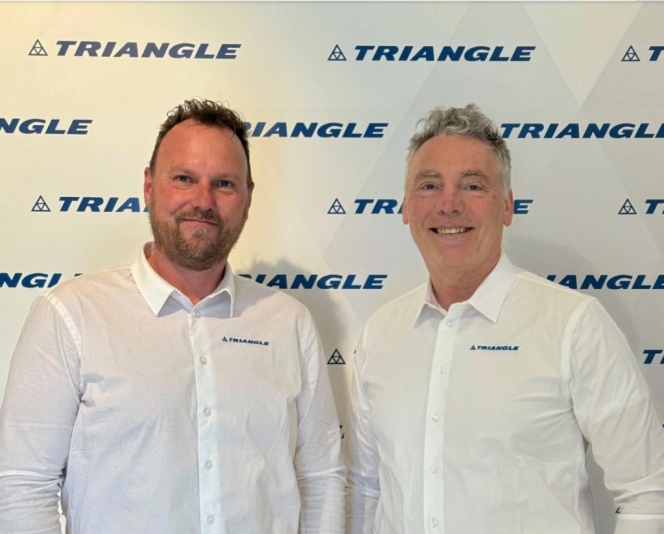
Triangle Tyre has significantly strengthened its European off-the-road operations with the appointment of Federico Parmesan as the new European OTR Technical Manager, a position he assumed on 1 March 2026. This strategic appointment represents a key milestone in the company's ongoing efforts to enhance its technical capabilities and expand its market presence across the continent's specialised tyre sector.
Parmesan brings more than three decades of tyre industry experience to his new role, with particular expertise concentrated in OTR and earthmoving applications. His extensive background encompasses not only deep technical knowledge but also a comprehensive understanding of the challenges faced by dealers and end-users operating in demanding environments. This combination of technical proficiency and practical insight positions him to effectively bridge the gap between product development and real-world application requirements.
In his new capacity, Parmesan will work closely with Triangle's partner network throughout Europe, providing support for both aftermarket and original equipment segments. His responsibilities include strengthening the company's field application expertise and contributing directly to the continued development of the OTR product portfolio. These efforts aim to deliver enhanced value and service to partners across the region.
The appointment reflects Triangle's strategic priority of reinforcing its technical structure to support ambitious growth objectives in the European OTR segment. The company seeks not merely to consolidate its existing market share but to achieve sustainable expansion while elevating support levels for its partners. Parmesan's extensive experience, energetic approach and positive attitude are expected to prove invaluable assets as Triangle pursues these goals and strengthens its position within the competitive European market.
ATF Tyres Appoints Rajesh Vyas As Vice President Of Sales And Marketing
- By TT News
- March 03, 2026

ATF Tyres, one of India’s leading manufacturers of off-highway tyres, has announced the appointment of Rajesh Vyas as its new Vice President of Sales and Marketing. Vyas brings over 25 years of global experience to the role, having worked across diverse international markets to build high-performance sales teams and enhance distribution networks.
His professional background includes leadership roles in brand positioning and product portfolio expansion within competitive sectors. Prior to joining ATF, Vyas served as Vice President at Rubber King Tyre Group. He also held key positions at Balkrishna Industries Limited as Head of Mining Tyres for India and spent a decade at Apollo Tyres Ltd as Business Head for Off-Highway Tyres.
With the company working to expand its footprint in the agricultural, industrial and OTR segments worldwide, Vyas’s strategic leadership and commercial insight are expected to support ATF Tyres in delivering performance-driven solutions across multiple regions.







Comments (0)
ADD COMMENT